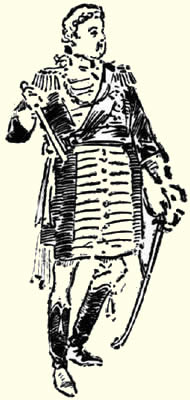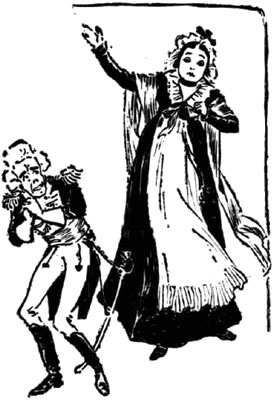 |
 |
||||||
THE NEW GILBERT OPERA AT THE LYRIC.
The Westminster Gazette, 29 October 1894
 |
| THE REGENT (MR. R. BARRINGTON) |
What a pity that one must call "His Excellency" the new Gilbert opera instead of the new Gilbert and Sullivan opera! The differences between the old collaborators that have led one to seek another composer and the other a new librettist are really a national misfortune: one. is disposed to look upon the two as trustees for the nation of a sort of merriment fund, and to feel that there has been a kind of breach of trust towards the public. If Dr. Osmond Carr's music had been equal to the best of Sir Arthur Sullivan's on Saturday, the audience would still have felt saddened at the loss of an old friend. However, one cannot deny the fact that we got on very well with the new firm. Mr. Gilbert's book is one of his best, and Dr. Carr's setting, even if it scarcely enhances its lustre, at the least does not dim it. The author has accomplished a wonderful feat—he has taken a subject which touches no burning question of the day, which parodies nothing, which has no connexion with love, hate, jealousy, or revenge, which attacks nothing, defends nothing, and yet, without stooping to the trick of introducing variety turns, has made an interesting, even fascinating book out of it. To say that he has worked faultlessly would be untrue; nevertheless one can assert that he has done what no other could, and regretfully add that in one respect it would have been a little better had he done it more as others would.
THE SUBJECT.
Macaulay's schoolboy knows that in 1807 Charles VII, King of Denmark, was out of his mind, and that Frederick, afterwards Frederick VII, reigned as Regent. In these days the city of Elsinore—chosen apparently by Mr. Gilbert in order to induce people to expect jokes that are not made—was governed by George Griffenfeld, a man of infinite humour in a fashion, who, deeming that there were no new verbal jokes to be made, went in heavily for practical joking. A stanza, in which he talks of the decay of verbal humour, seems worthy of quotation:—
| In search of quip and quiddity, I've sat all day alone, apart, | |
| And all that I could hit on as a problem was—to find | |
| Analogy between a scrag of mutton and a Bony part, | |
| Which offers slight employment to the speculative mind: | |
| For you cannot call it very good, however great your charity— | |
| It's not the sort of humour that is greeted with a shout— | |
| And I've come to the conclusion that the mine of jocularity | |
| In present Anno Domini is worked completely out Though the notion you may scout, I ran prove beyond a doubt That the mine of jocularity is utterly worked out. |
|
 |
| NANA (MISS JESSIE BOND) |
That evil creature for five-and-forty years had indulged in practical jokes, apparently of little originality, without coming to grief. Naturally, he was hated in the town, since, as his daughters observed, he would “condescend to play practical jokes on the very meanest," and “was -never so happy as when he was making dignified people ridiculous." One is tempted at first to suppose that another line from the text, “These jokes are all extremely cheap," will be a criticism on the piece. One of his most daring strokes was to make the garrison drill as ballet-girls. When the Hussars came dancing on in full uniform and kept and hopping, turning, and twisting, the audience roared with laughter, while a ballet during the second act, in which the corporal acted as a prima ballerina assoluta quite delighted the house: yet this comic business is not Mr. Gilbert at his best. In a fiendish mood Griffenfeld plays a wicked joke on two young men who are sueing his pretty daughters — the girls are little better than their father. He causes one of them, Erling, a sculptor, to set up a monument at his own expense of the Regent, and in the King's name promises wealth and title to him; somewhat similar treatment he measures out to Erling's friend Tortenssen. With these luckless gulls, Nanna and Thora, Griffenfeld's fascinating daughters, flirt cruelly. Now the fame of the Governor, or, rather, report of it, had reached Copenhagen, and the Regent, although the foreign politics of Denmark were in a critical state, disguised himself in rough garments, and calling himself Nils Egilsson, a strolling player, came to Elsinore to make personal inquiries. The first adventure of this Danish Haroun al Raschid was a love affair. A pretty ballad-singer named Christina —whose part seems simply added to the piece in order to make a place for a prima donna—had fallen in love with Erling's statue of the Regent, and, finding that the so-called Nils Egilsson is its counterpart, transfers her love to him. The scene between the two is charmingly written, and makes one regret that the dramatist does not give them a love scene of warmer character in the second act. If there were less of the Pontius Pilate about Mr. Gilbert in respect of his writing, one might hope he would take a hint and correct a fault in construction that hurts the piece and robs it of some pretty work. One of the cleverest numbers of the book occurs in this scene. It is a song concerning the sufferings of Royalty from the National Anthem, and one stanza may be cited:—
| It serves a good purpose, I own: | ||||
| Its strains are devout and impressive— | ||||
| Its heart stirring notes raise a lump in our throats | ||||
| As we burn with devotion excessive: | ||||
| But the King who has been bored by that song From his cradle—each day—all day long— |
||||
| Who's heard it loud-shouted | ||||
| By throats operatic, | ||||
| And loyally spouted | ||||
| By courtiers emphatic— | ||||
| By soldier—by sailor—by drum and by fife— Small blame if he thinks it the plague of his life: While his subjects sing loudly and long, |
||||
| Their King who would willingly ban them— | ||||
| Sits worry disguising, anathematising | ||||
| That Bogie, the National Anthem | ||||
Soon the Regent meets the Governor. Griffenfeld taking him to be Nils Egelsson, as he calls himself, and, noticing his resemblance to the Regent, sees a way to a "tremendous joke", to one that will crown his career as a practical joker, so he offers him five gold pieces on condition that he will pose as Regent, and by showering sham riches and sham honours on the Governor's sham friends hoax them in a brilliantly cruel fashion. In this proposal the Regent sees a splendid lex talionis punishment for Griffenfeld, so he accepts. Here, it will be seen, is a really fine dramatic situation. The joke that the dramatist seemed to be drawing out far too fine shows that it is true gold, and has the marvellous ductility of the master metal. For sake of it, and on account of the quaintly topsy-turvy apology for such a practical joke as raising false hopes that is contained in the following lines, one can forgive more than needs forgiveness:—
| Oh, human joy at bet is brief, Alas, too soon it's turned to grief! So it's our duty, you'll allow, Our fellow creatures, to endow With happiness complete and vast, Although that happiness may last |
|
| But half-an-hour or thereabouts. | |
 |
| MR. GROSSMITH AND MISS BARNETT |
There is something to be forgiven. Mr. Gilbert once more relies on the comical contrast between the size and strength of Miss Alice Barnett and the smallness of Mr. George Grossmith, and indulges in some heavily laboured jokes concerning the battle between the diabolical temper and iron will of the lady when raised to anger. About her somewhat remote connexion with the plot nothing need be said.
After this exposition of the subject, it is easy to foresee the conclusion. The Regent, entering into the fun of the Governor's jest, carries out his instructions, and declares that all the wrongs done by this cruel jester shall be set right, and that their author shall be degraded. Everyone rejoices, and none more heartily than the Governor and his daughters. In order to fatten the jest, Griffenfeld holds back his announcement, and so does the Regent, till all the people are on the point of accomplishing the happy reforms. Then, exultant, with fiendish joy the jester declares—and believes it to be true—that the Regent is but an impostor: a moment later, to his horror and stupefaction, he learns the real truth, and discovers that Nils Egilsson, whom he has insulted and bribed, is Regent and lord and master. Here the piece really ends: but the dramatist, though he has omitted the second love scene between the Regent and Christina, introduces an abrupt unsatisfactory offer of honourable love by the late Nils Egilsson to Christina the irrelevant. In this account we have succeeded in pointing out almost all that is worthy of censure—mild censure--and failed even to touch upon a tithe of what is amusing in song, speech, and business. Certain it is that one could find columns full of matter that deserves quotation, but instead we heartily recommend people to see the piece.
THE. MUSIC AND PERFORMANCE.
We have already suggested that Dr. Carr can hardly take the place of Sir Arthur Sullivan. The breadth of humour in melody, subtle comicality in orchestration, and, above all, distinction of style that in music, as in literature, is apart from mere skill of workmanship which should secure immortality for some of the comic-opera music of Sir Arthur—which, however, are qualities that have been reached step by step—are not to be found in "His Excellency." Yet Dr. Carr, if second to one is third to none, and the cleverness of his instrumentation, liveliness of his rhythms, skill of finales, and charm of some of his melodies—a quartet in the second act is a delicious example—earned him hearty spontaneous applause and encores primarily due to his labours that were well deserved by his able accomplishment of the most difficult task that he has yet undertaken. Miss Nancy Mclntosh, the Christina, as a singer proved rather disappointing: her music perhaps was trying and not exactly grateful; yet, unless her voice was out of order, it must be deemed rather thinner and less interesting than when she made her début in "Utopia Limited." However, she shone as an actress, and in her one important scene charmed everybody. Miss Jessie Bond and Miss Ellaline Terriss as the Governor's daughters were absolutely delightful—they made a dainty pair of brune and blonde, the one in tender green and the other in almond-blossom pink—and the merriness of their acting and dancing, and cleverness of their singing rendered them irresistible. Mr. George Grossmith had a splendid reception, but, though he sang excellently, his acting as the Governor seemed rather weak by the side of that of Mr. John Le Hay, who was truly comic as an old lawyer. There was a somewhat surprising charm in Mr. Rutland Barrington's little love scene, and in other respects he did as much as the Regent's part would allow. The scenery, though money has been spent, is not remarkably beautiful, but Mr. Percy Andersen has designed many lovely dresses that form fascinating harmonies of tone. If warmth of applause be test of success "His Excellency" may outlive the century; certainly it is likely to have a great success, since all judicious playgoers will pay a visit to the Lyric Theatre.
|
Page modified 25 October 2020